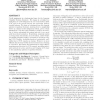Free Online Productivity Tools
i2Speak
i2Symbol
i2OCR
iTex2Img
iWeb2Print
iWeb2Shot
i2Type
iPdf2Split
iPdf2Merge
i2Bopomofo
i2Arabic
i2Style
i2Image
i2PDF
iLatex2Rtf
Sci2ools
144
click to vote
GECCO
2007
Springer
2007
Springer
UCSpv: principled voting in UCS rule populations
Credit assignment is a fundamental issue for the Learning Classifier Systems literature. We engage in a detailed investigation of credit assignment in one recent system called UCS, and in the process uncover two previously undocumented features. We draw on techniques from the classical pattern recognition literature, showing how to analytically derive an optimal credit assignment system, given certain assumptions. Our aim is not primarily to improve accuracy, but to better understand the system and put it on a more solid theoretical foundation. Nonetheless, empirical results on benign data demonstrate our new system, called UCSpv (UCS with principled voting), can match or exceed the original UCS. Further, its fitness function is principled, and, unlike that of UCS, requires no tuning. However, on more difficult data it seems UCSpv does need some form of tuning or correction. We believe the framework we adopt offers a promising new direction for LCS research, providing principled me...
| Added | 07 Jun 2010 |
| Updated | 07 Jun 2010 |
| Type | Conference |
| Year | 2007 |
| Where | GECCO |
| Authors | Gavin Brown, Tim Kovacs, James A. R. Marshall |
Comments (0)

